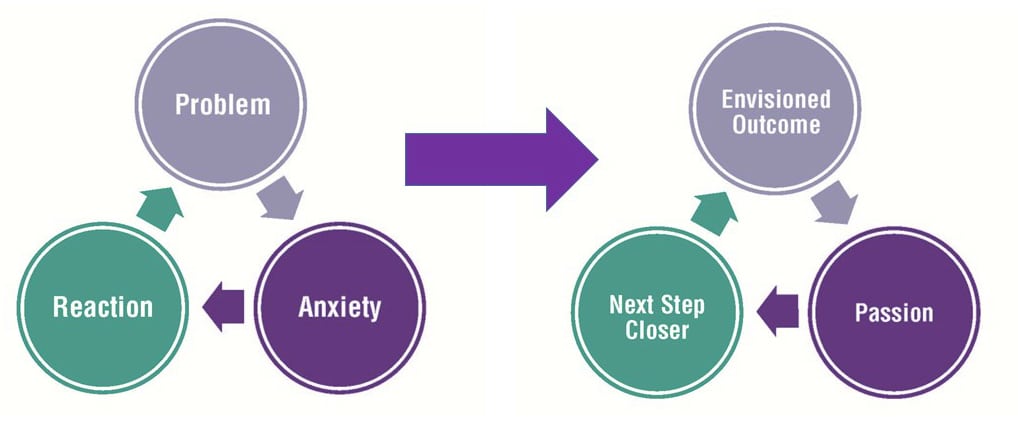
Be Cool Under Pressure–6 Steps To Save Face
June 16, 2015
The Connection Between Peace & Power
July 22, 2015So how do great leaders do it?
Have you ever done something with the best intentions only to have it backfire?
Understanding how to light up the brain’s reward network and stay out of the pain network can help you to avoid common pitfalls (thanks to Naomi Eisenberger of UCLA for her research here).
The brain’s pain network gets activated when we feel physical pain (lack of safety), social exclusion (no belonging), bereavement (loss), betrayal (unfair treatment), and negative social comparison (no mattering). Our reward network is activated when we feel things like physical pleasure (safety), cooperating (belonging), having a good reputation (mattering), being treated fairly (trust), giving to charity (safety plus = abundance).
A tribe that continuously activates the reward network—a SmartTribe—is more productive and effective. A tribe that continuously activates the pain network suffers from three key leadership pitfalls:

Pitfall #1: Asking for feedback and not acting on it.
Having a 360 degree assessment and asking for feedback takes courage and helps to create an open and transparent culture. However, we have also seen this tool misused and create damage.
The damage happens when a leader asks for feedback and then either does nothing to improve him or herself or attempts to identify the source of criticism and punish it. Persecuting someone who took a risk to respond to your request is an obvious trust breaker, but why is doing nothing so bad?
When we take the time to give feedback to someone we have most likely thought about it, and feel that the person is not able to see or to prioritize something that can be clearly seen from the outside. When we do nothing, we discount the feedback giver’s experience and their desire to create a more positive outcome—we send them into the pain network through a sense of loss of belonging, mattering and possibly safety. Not responding may result in having them feel imminent persecution. Our clients find that combining executive coaching, once they received their 360 feedback action plan, provides long lasting desired results. Doing an employee survey of anything, and then disregarding the results is the same–it activates the pain network.
Asking is a very powerful tool. One that can be successfully used to maximize engagement and growth. Just make sure you also plan and invest resources in the follow up.
Pitfall #2: Flat or misaligned mission, vision and values.
Do you “sell” your mission, vision and values…do you sell the raison d’etre of your company to your team and prospective team? By “selling” here we mean:
- Starting with the market analysis (what engages and drives your people—and the people you’d like to have come work with you?)
- Developing and designing the product (are you crafting emotional statements that inspire positive feelings? Does your environment match your words? Does your operating/reward system match your values?)
- Are you marketing and selling? (are you communicating the mission, the vision, and the values in a way that sparks joy and enthusiasm? Are you identifying your tribal leaders and engaging them?)
Too often we walk into a company and find wordy mission statements moldering on the wall. Worse yet, we find reward systems that directly contradict stated values (e.g. stated value of “teamwork” but only individual rewards.)
When the mission, vision and values are stale, or not aligned, or not communicated in an enticing way, it not only does not activate the reward network, it activates the pain network. People feel a lack of belonging, they feel low social status in comparison with others who work for organizations that are alive and aligned, they may feel betrayed if there is a conflict between what they signed up for and what is happening or between a stated value and reality.
Flat or misaligned mission, vision and values don’t just fail to inspire. They hurt.
When was the last time you assessed your culture?
Pitfall #3: Ineffective delegation. Delegate, delegate, delegate!
One of our most popular SmartTribes Methodology processes is where we identify Low Value Activities and High Value Activities. The goal is to delegate your Low Value Activities as quickly as possible.
So what’s the problem here?
Delegation sends people into the pain network when it falls to the micro-management side of the spectrum or when what we call “drive by delegation” occurs—delegating without getting buy in, commitment, or assessing capability and capacity. Both sides of the spectrum indicate a lack of trust and misunderstanding about responsibilities. Both sides are going to fire up the pain network in both parties.
Micro-management leaves the delegator thinking they are alone and have to do everything, if they want to get anything done right. The would-be delegatee feels disempowered, excluded, and low status…they can’t get anything right and their opinions don’t matter.
Drive by delegation leaves the delegator feeling betrayed (because there’s no way the delegatee can do the task or project). The delegatee feels confused, and has a sense of loss…they might have had a dream about doing just this task but now they’ve been handed it in a way that they cannot succeed.
Proper delegation activates the reward network and is a win-win for everyone. Our clients use the SmartTribes Playbook: Effective Delegation Process to successfully complete these steps: assess capabilities and capacity, plan the outcome using a guided question format, set up milestones and implement tracking and check-ins.
Asking for feedback and input, creating mission, vision and values statements, and delegation are three powerful tools for building trust and long term engagement. Just be sure to use them in the ways that keep you and your team out of the pain network and activating the reward network.
How will you build trust in your organization?




